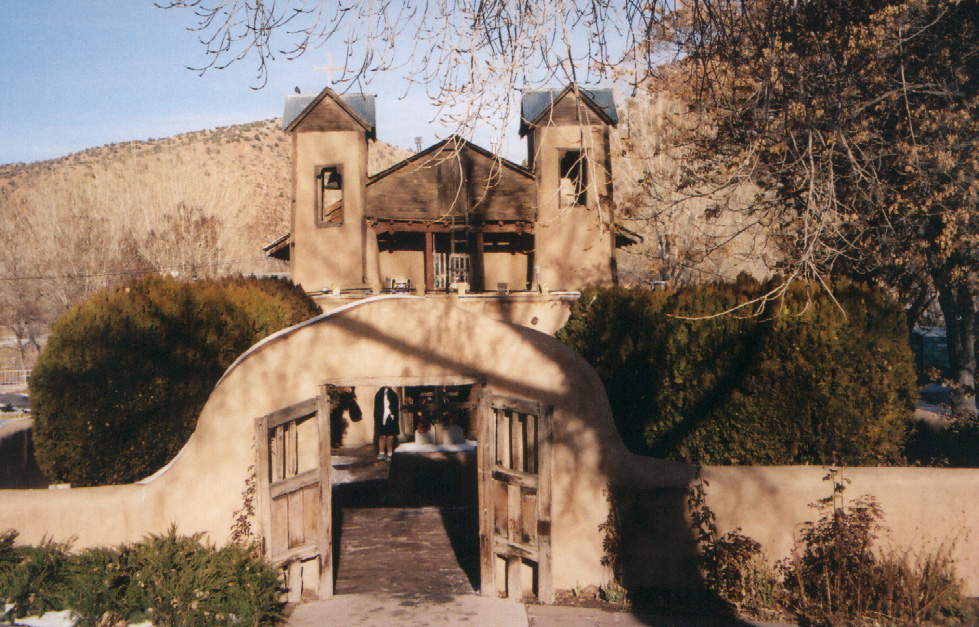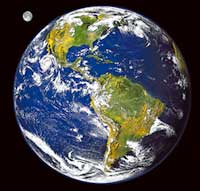 Faith, Technology and Ecology
Faith, Technology and Ecology
What we are and what we are becoming; in the light of where
we believe we came from and actually emerged into the world.
Sanctuario at Chimayo, where idigenous peoples believed there to exist healing earth -- dirt from a distant mountain that possessed miraculous powers to cure people's afflictions.
Faith and Science | Science and what we are made of | Faith and Signs | Sacred qualities | Nature Theology
His All Holiness, Bartholomew I, Archbishop of Constantinople, New Rome and Ecumenical Patriarch, announced, "that attacks on the environment should be considered sins, he called pollution of the world's waters "a new Apocalypse" and speaking on an Aegean island, he led global calls for "creation care". The Patriarch of Constantinople --now Istanbul-- is the spiritual leader of 300 million Orthodox Christians and 270th successor to the Apostle Andrew. He is also extremely green, taking heads of church and state to areas beset with environmental problems - the Amazon and Arctic among them - and confronting them with the best science.
See: Interfaith Power and Light campaign
Call to people of faith to protect the Lord's commons.
social justice ties in.
“Simply put, the matter in the universe and the forces
that hold it together, which appear in a bewildering variety of complex forms,
may be nothing but different vibrations of hyperspace.”
Michio Kaku, Hyperspace, 1996
 Earth, Water, and Air
Earth, Water, and Air
The initial idea from the Greek writings attributed to Hippocrates was that "airs, waters and places" made up the totality of experiences from our surroundings that affected human health and well being.
Faith in a Seed
In Christian tradition, which is itself a borrowing from pagan Egyptian, Babylonian, Hebrew and Greek traditions, there have been some major historical splits called schisms that divided different factions within the larger fold of believers.
Ancient: schisms among manichean, arian and gnostic attitudes.
Medieval: Schism between eastern and western beliefs.
Late Medieval: Schism between Rome and national churches
Renaissance: Galileo's mistaken schism with the Vatican.
Modern: Darwin and unity despite a contrived schism.
Four elements (ancient) versus four (three) forces (moderne)
- gravitational force that keeps galaxies together over vast distances
- elecro(magnetic)-weak force that releases radiation to fission massive elements
- strong nuclear force that binds protons to build heavy elements
Grand Unification is Eintein's vision that all forces can be resolved as different mathematical expressions of a single underlying force of nature.
Turning Point is Frijof Capra's belief that our biological, mechanical, and electro-chemical knowldge is coming to gether to reveal a deeper comrehension of the cosmos and its functional integrity.
Emergent Narrative is that we are in --embedded within a time bound, evolving and stochasticalally moving-- process from which it is impossible for us to understand the outcome or end to which the currents swiftly drag everything toward an ever modified state from a less modified condition.
Old Narrative consists of the western Asian and Egyption derived mysteries about our being made in the image of a creator god whose children we are and who punished us for being curious in the edenic garden which we were given to keep.
Testaments (all of these traditions believe in the sanctity of Jerusalem.)
Old, Hebrew inspired stories that we have translated from the Greek.
New, Greek based but reformed Hebrew inspired stories compiled by Irenaeus of Lyon after Constantine made Christianity the Roman state relgious creed.
Quran, Greek, Hebrew and Christian inspired but alleged to be Gods (Allaahs) words dictated to Mohammed his prophet in the sixth century of teh common era.
Ecology of belief
aesthetics and ethics combine to form reflective, intentional
mindfulness in our activities and the beliefs that inform our actions. Ecology is a synthesis of explanations about how the household of humanity and the house of life compete with or contribute to the mutual exlusion or survival of each.
| Era |
Technology |
Stories |
|
Prehistoric |
language |
|
|
Ancient |
deus ex machina |
|
|
Medieval |
water & windmills |
|
|
Modern |
engines |
|
|
Post Modern |
x rays |
|
Ancient -- the Hippocratic Corpus, Vedas and Tao T'Ching:
from these oldest sources a common or divergent theme emerges of humans estranged from the natural order.
Hippocratic Corpus from the pre-socratic world was concerned with Airs, Waters, and Places to explain the many manifestations of the earth's powers to bring forth warmth, grow new vegetation on an annuial basis, and nourish the human race.
Four elements or five phases
Medieval -- Saint Francis of Assisi, the story of his encounter with wolf of Gubio and his prayer entitled
"Brother sun and Sister Moon" reveal Francis as a nature mystic who saw the mystical body of Christ as encompassing not just people but other creatures of the earlier days of creation which God had subsequently redeemed by the sacrifice of Jesus.
Is this world actually a pagan body adorned with Christ's clothes?
Modern -- Sir Isaac Newton believed in a unity of God and estimated the second coming based on Biblical sources to occur about 2040 AD.
-- Mr. Einstein on the other hand is an agnostic voice, that nevertheless thought that God did not play dice when creating the universe, meaning that rational and mathematical principles, as Galileo suggested, were the foundation of universal laws that govern nature.
-- In his book the Turning Point, modern physicist, Frtijof Capra argues that there is a new deism emerging based on natural science and the rare existence of life in an otherwise huge, hostile, and uninhabitable universe.
The four (three) forces:
The electro-weak, the strong nuclear and the gravitational forces that account for all movement in the visible cosmos.
Meaning of the Emergent Narrative
The evolution of the senses into a multiplicity of intelligent, sentient beings
who may live to tell their story. This is a really new and deeply spiritual story of our being here in this place to care for its creatures.
We are commanded to keep the garden as the oldest duty derived from a careful reading of Genesis or the Rig Veda. This suggests these religions are the reflection of an agrarian people's belief in the divinity of creation and the sanctity of the earth's sources of nourishment.

 Earth, Water, and Air
Earth, Water, and Air Faith, Technology and Ecology
Faith, Technology and Ecology
